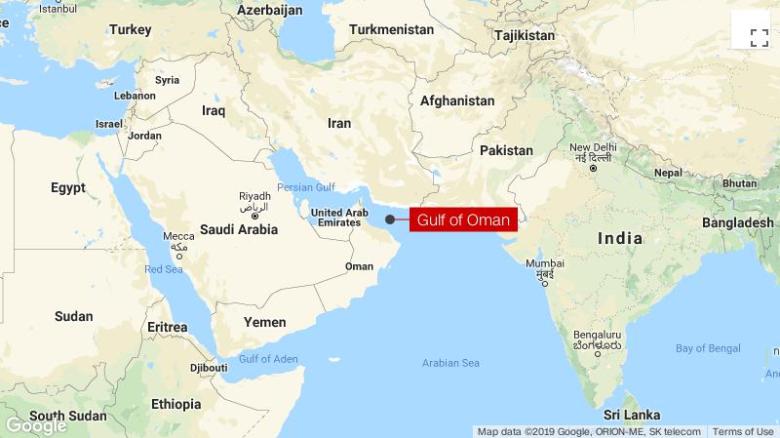Coping With Iranian Intransigence
"It is the assessment of the United States government that the Islamic Republic of Iran is responsible for the attacks that occurred in the Gulf of Oman today."
"This assessment is based on intelligence, the weapons used, the level of expertise needed to execute the operation, recent similar Iranian attacks on shipping, and the fact that no proxy group operating in the area has the resources and proficiency to act with such a high degree of sophistication."
"Iran's Supreme Leader rejected Prime Minister Abe's diplomacy today by saying he has no response to President Trump and will not answer."
U.S. Secretary of State Mike Pompeo

"We need to remember that some 30 percent of the world's [seaborne] crude oil passes through the straits."Iran has threatened to close the Strait of Hormuz for years. It has on occasion committed to hostile acts against other countries' vessels passing through the Strait. More latterly it re-issued those threats in response to its deepening economic crisis brought on by the new sanctions imposed by the Trump administration to force the Republic to return to the bargaining table, after the White House withdrew from the nuclear agreement signed between Iran and the members of the Security Council plus Germany and the EU.
"If the waters are becoming unsafe, the supply to the entire Western world could be at risk."
Paolo d'Amico, chairman, INTERTANKO Tanker association
President Trump has stated his intention on forcing Iran to stand back from its nuclear enrichment entirely, along with the threats inherent in continued development of missiles, an issue of great importance to the region, and which the 2015 Iran nuclear deal failed to address. That, and its ongoing support of and incitement to violence of its proxy militias in Lebanon, Syria, Iraq and Yemen representing additional issues of huge importance both in the Middle East and abroad.
Tensions have been growing between Washington and Tehran since President Trump cancelled U.S. support for the Iranian nuclear agreement when he stated the obvious, that it had no teeth. Secretary of State Pompeo minced few words when he noted that behind the attacks lay a "maximum pressure campaign" of sanctions imposed by the administration he is part of. Sanctions designed to force Iran to negotiate the future of its nuclear program and its militia support threatening the stability of the Middle East.
 |
| This still, obtained by AFP from Iranian State TV IRIB, purports to show smoke billowing from a tanker said to have been attacked off Oman |
These most recent attacks near the entry to the Strait of Hormuz which represents a critical shipping artery for Gulf energy producers and Saudi Arabia have all the hallmarks of Iran's viciously destructive skulduggery. Iran's May12 attacks on four tankers set the pattern, and it appears to be on repeat, though Iran denies any involvement.
According to Iranian Foreign Minister Mohammad Javad Zarif the incidents are "suspicious", and he's certainly right there; suspicious to others, a seemingly logical manoeuvre to Iran, however.
Thursday's attack targeted a Japanese and a Norwegian tanker, just as Japanese Prime Minister Shinzo Abe was attempting to persuade Iran, on a diplomatic mission to Tehran, to de-escalate the situation and agree to negotiations with the United States.
The crew of the Kokuka Courageous tanker owned by Japan was safely picked up after the tanker was hit by a suspected torpedo. On the side of the Japanese tanker an unexploded device, presumably a limpet mine, was seen. It would appear that an Iranian ship and crew were dispatched to remove the mine from the Japanese tanker. The Norwegian-owned Front Altair was the first of the two to be attacked; its crew abandoned ship between Gulf Arab states waters and Iran following a blast.
That explosion was theorized to have been caused by a magnetic mine setting the ship ablaze, with a huge plume of smoke reaching toward the sky. Its crew was plucked to safety by a passing ship that handed them to an Iranian rescue boat. According to Saudi Arabia, this latest incident, along with new attacks on Saudi soil by Houthi rebels from Yemen, represent a "major escalation" of hostilities between Iran and the Gulf nations.
As an ally of Iran, Russia has urged caution, urging no one to rush to judgement, much less use the incident to place additional pressure on Tehran.
"Our policy remains an economic and diplomatic effort to bring Iran back to the negotiating table at the right time to encourage a comprehensive deal that addresses the broad range of threats [from Iran]."
"Iran should meet diplomacy with diplomacy, not with terror, bloodshed and extortion."
U.S. Secretary of State Mike Pompeo

Labels: Bombs, Iran, Middle East, Shipping vessels, Strait of Hormuz, Threats, United States

<< Home